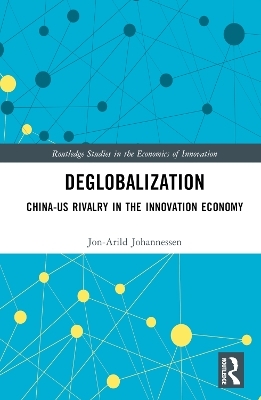
Deglobalization
China-US Rivalry in the Innovation Economy
Seiten
2023
Routledge (Verlag)
978-1-032-49776-1 (ISBN)
Routledge (Verlag)
978-1-032-49776-1 (ISBN)
The book analyzes US-China relations from a systemic thinking approach. The focus is the emerging innovation economy which leads to tension and deglobalization. The book is grounded in evolutionary economics and uses conceptual generalization in its descriptions, analysis, theoretical reflections and real-world cases.
The emerging conflict between the US and China has an inherent tendency towards a development of deglobalization. It is the historical prerequisites for this deglobalization that are examined in this book. These assumptions are largely based on what is termed the second wave of globalization, based on increasing technological competition between the US and China, as well as China's expansion along the New Silk Road.
In this book, the author makes a distinction between the Old Globalization and the New Globalization. The Old Globalization was characterized by competition over costs in general and wage costs in particular, while the New Globalization is categorized by new competencies and skills, especially technological capabilities and technological innovations. The second wave, which is driven by technological innovations, lays the foundation for a counter-strategy on the part of the US to stem the Chinese technological expansion. It is this new strategy that confines the second wave of globalization from China and lays the foundation for deglobalization.
The book analyses US-China relations from a fresh perspective, namely a systemic thinking approach. The focus is the emerging innovation economy, which leads to tension and deglobalization. The book is grounded in evolutionary economics and uses conceptual generalization in its descriptions, analysis, theoretical reflections, and real-world cases.
The key message is that the economy of the future will be characterized by coordinated wave movements: economic growth mainly controlled by private capital alternating with economic downturns that necessitate collective solutions and government interventions.The book offers policy suggestions, which include promoting effective macroeconomic policies, and extending microeconomic cooperation schemes, related to the innovation economy.
The emerging conflict between the US and China has an inherent tendency towards a development of deglobalization. It is the historical prerequisites for this deglobalization that are examined in this book. These assumptions are largely based on what is termed the second wave of globalization, based on increasing technological competition between the US and China, as well as China's expansion along the New Silk Road.
In this book, the author makes a distinction between the Old Globalization and the New Globalization. The Old Globalization was characterized by competition over costs in general and wage costs in particular, while the New Globalization is categorized by new competencies and skills, especially technological capabilities and technological innovations. The second wave, which is driven by technological innovations, lays the foundation for a counter-strategy on the part of the US to stem the Chinese technological expansion. It is this new strategy that confines the second wave of globalization from China and lays the foundation for deglobalization.
The book analyses US-China relations from a fresh perspective, namely a systemic thinking approach. The focus is the emerging innovation economy, which leads to tension and deglobalization. The book is grounded in evolutionary economics and uses conceptual generalization in its descriptions, analysis, theoretical reflections, and real-world cases.
The key message is that the economy of the future will be characterized by coordinated wave movements: economic growth mainly controlled by private capital alternating with economic downturns that necessitate collective solutions and government interventions.The book offers policy suggestions, which include promoting effective macroeconomic policies, and extending microeconomic cooperation schemes, related to the innovation economy.
Jon-Arild Johannessen is full professor at Kristiania University College, Oslo, Norway.
1. Towards deglobalization 2. Technological innovations drive deglobalization 3. Deglobalization: A new economic world order (USA-China)
| Erscheinungsdatum | 13.12.2023 |
|---|---|
| Reihe/Serie | Routledge Studies in the Economics of Innovation |
| Zusatzinfo | 41 Line drawings, black and white; 41 Illustrations, black and white |
| Verlagsort | London |
| Sprache | englisch |
| Maße | 156 x 234 mm |
| Gewicht | 453 g |
| Themenwelt | Sozialwissenschaften ► Soziologie ► Spezielle Soziologien |
| Wirtschaft ► Allgemeines / Lexika | |
| Wirtschaft ► Volkswirtschaftslehre ► Makroökonomie | |
| ISBN-10 | 1-032-49776-9 / 1032497769 |
| ISBN-13 | 978-1-032-49776-1 / 9781032497761 |
| Zustand | Neuware |
| Informationen gemäß Produktsicherheitsverordnung (GPSR) | |
| Haben Sie eine Frage zum Produkt? |
Mehr entdecken
aus dem Bereich
aus dem Bereich
Mentalitäts- und Interessengegensätze im Streit um Transformation
Buch | Softcover (2024)
Campus (Verlag)
34,00 €


